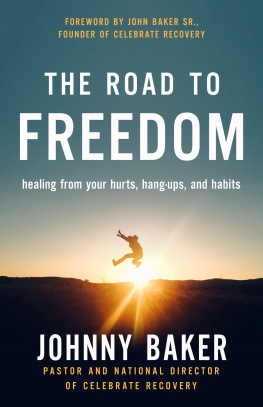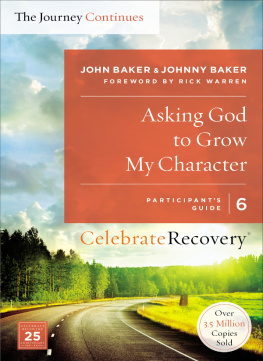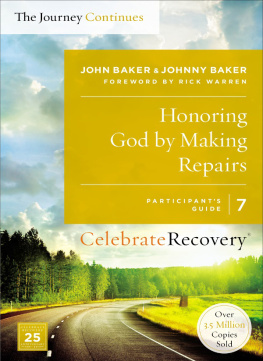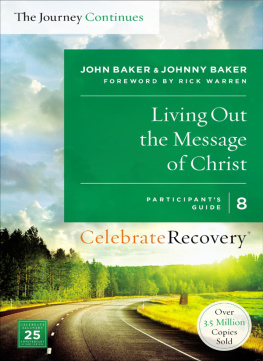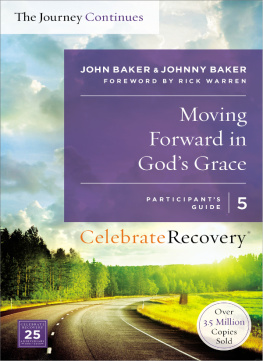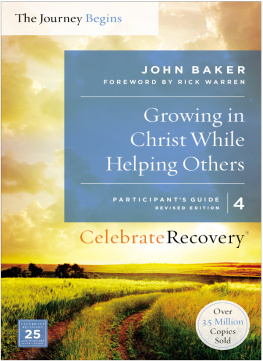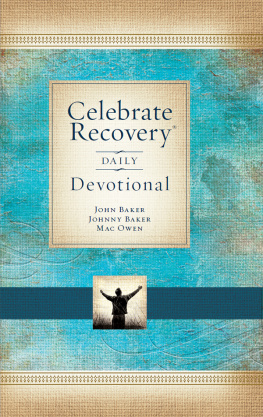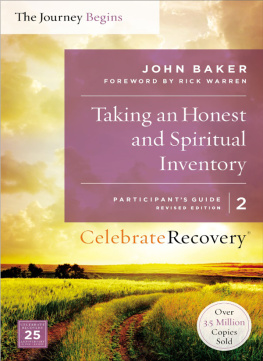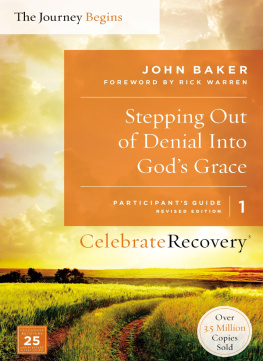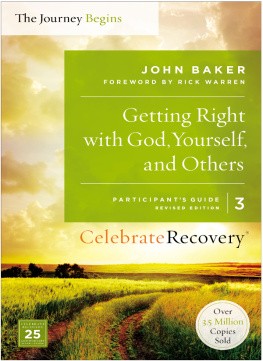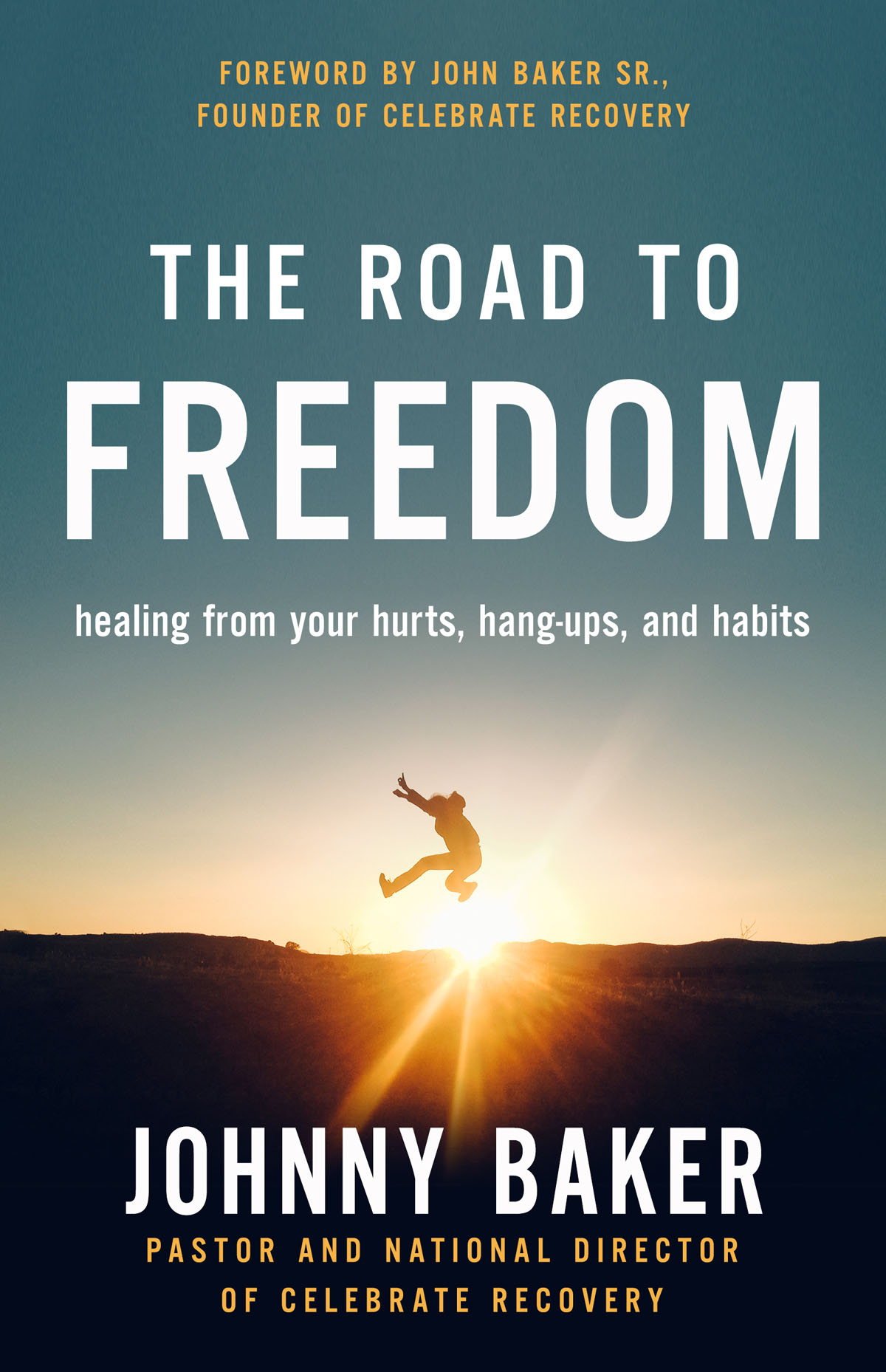Contents
Guide
Contents
T his is where it all begins. To change in any area, we must first admit we have a problem. In recovery we call this coming out of denial, which means we realize that things in our lives are out of control and unmanageable. Its right there in the first of the eight Celebrate Recovery principles. Principle 1 says, Realize Im not God. I admit that I am powerless to control my tendency to do the wrong thing and that my life is unmanageable. This is the beginning of the journey.
But for many of us, myself included, this step is easier said than done. None of us likes to admit we have problems. Its easy to point at the addict and say, Well, obviously her life is a mess! But its much harder to look at the image in the mirror and say the same thing. We have bought the lie that to be strong, we have to have it all together. And the first step in having it all together is making sure we never even appear to be out of control.
Then we look at our bank accounts and we see major debt with no way to get out. We look at our scales and see our weight creeping up year after year. We look at our sons and daughters and wish we could help them avoid the mistakes we made when we were their age. We fear that someone will find our browser history and find out what weve been looking at online. We worry that someone will see us tear up for no good reason and find out weve been battling depression. We pull up to church fighting with our family and yell, Were at church! Pull it together! These people think were normal!
So if this is universal, if we all have these kinds of issues, shouldnt it be easy to admit it? We all know that its not.
Over the years, Celebrate Recovery ministries have begun in almost every major Christian denomination and in prisons, military bases, youth homes, and recovery centers. Every state in America has at least one Celebrate Recovery ministry, and most have many more. But from time to time, were told, Well, I dont think Celebrate Recovery will work in [insert specific culture, people group, or geographic region], because people in my [specific culture, people group, or geographic region] dont talk openly about our issues. You know whats funny? Weve heard that about pretty much every culture, people group, or geographic region. Theres a simple reason why: talking about our issues isnt normal.
Normal People
Normal people keep their issues to themselves. Normal people dont admit they need help. Normal people dont talk about whats wrong. You know who does? Those people. You know those people, dont you? Yeah. Them. Those people are the ones who talk about stuff youre supposed to keep to yourself. Those people seek help when they need it instead of pretending everything is okay. Those people are filling our Celebrate Recovery groups and counselors offices and support groups all around the world. And those people are getting better.
Now, if youre a normal person, dont worry about it; what those people know is that you have issues too. The truth about those people is that we were once normal too. You wouldnt know it by looking at some of us, but we were. Then something happened. Something big that caused us to look over at those people and say, I want that. It was scary for us; none of us wanted to do it. We were fine with normal, but the situations we found ourselves in wouldnt allow us to stay normal.
You may have heard this referred to as hitting rock bottom or having a moment of clarity. However you refer to it, the result is the same: something makes it impossible to ignore the problem. My wife was pregnant with our first child, and suddenly I couldnt pretend my drinking wasnt a problem any longer. This little baby was going to change everything, and I didnt want to carry my baggage into fatherhood. I couldnt pretend everything was okay anymore.
In the Bible, David had this kind of moment. He said, When I kept silent, my bones wasted away through my groaning all day long. For day and night your hand was heavy on me; my strength was sapped as in the heat of summer. Then I acknowledged my sin to you and did not cover up my iniquity. I said, I will confess my transgressions to the LORD. And you forgave the guilt of my sin (Ps. 32:35).
David knew what its like to try to keep sins, out-of-control behavior, or what we in Celebrate Recovery call hurts, hang-ups, and habits a secret. Maybe you can identify with the first part of that verse. Maybe you have tried to deny that you have pain or that something in your life is out of whack, and youve felt that wasting, groaning, strength-sapping feeling David felt. Youve experienced a moment of clarity.
God will use pain to get your attention. Notice how David says, For day and night your hand was heavy on me. David is talking about the hand of God. Hes saying that God put the pressure on him and wouldnt let up. C. S. Lewis wrote, Pain insists upon being attended to. God whispers to us in our pleasures, speaks in our consciences, but shouts in our pains. It is his megaphone to rouse a deaf world. In recovery, we have found this to be true. When God wants to get our attention, he uses pain. So when we find ourselves in pain, we have two options. First (spoiler alert: this is the right option), we can turn from our pain to God. Or second, we can allow the pain to grow and get worse and worse.
I hate going to the dentist. Hate. It. If you are a dentist or a dental assistant or anything like that, Im sure you are a fine person, but one of my main goals in life is never to see you in your office. I hate everything about going to the dentist. I hate the smell of the office. I hate that little light they shine in your face. I hate the metal tools they use to dig around in your mouth. I especially hate the flossing lecture. Look, Im never going to floss. It hasnt happened yet; I think we can pretty much write it off.
But sometimes I have to go to the dentist. Not every six months for scheduled checkups (Im pretty sure thats a little joke they tell. Who does that?), but only when I am in pain. Not the little pain a few ibuprofen a day can take care of, but the knee-buckling, earth-shattering, why did God even put nerves in our teeth in the first place? kind of pain. Then, and only then, will I go to the dentist. Sometimes they can save a tooth or do a few things to take the pain away, but sometimes they have to do a root canal. The devil invented root canals. What do you think gnashing of teeth means? If I went to the dentist every six months like they say youre supposed to, they would catch problems before they caused pain. Theyd be less expensive and the treatment would be less painful. But I dont. I wait and I wait until the pain is unbearable.
Go ahead and judge me, but many of us do the same thing with the pain in our lives. We see that our marriages could use some work, but we decide wed rather avoid a fight. And the pain gets worse. We say we are going to change this time for real, but we find ourselves right back in the old behavior. And the pain gets worse. We wish we could stand up for ourselves against the bullies in our families, but we are too afraid. It isnt that big of a deal, so we stay silent. And the pain gets worse. I dont know what causes you pain, but I do know that left untreated, it will get worse.
First Steps
So where do we begin? We come out of denial. Coming out of denial means admitting our pain. We havent fixed anything yet, but we have taken the first step to finding the change we need. In his book Lifes Healing Choices, Pastor John Baker (my father) puts it this way: To deny your pain is to refuse Gods power to help you recover. You will never find healing from your hurts, hang-ups, and habits until you confront your pain.

